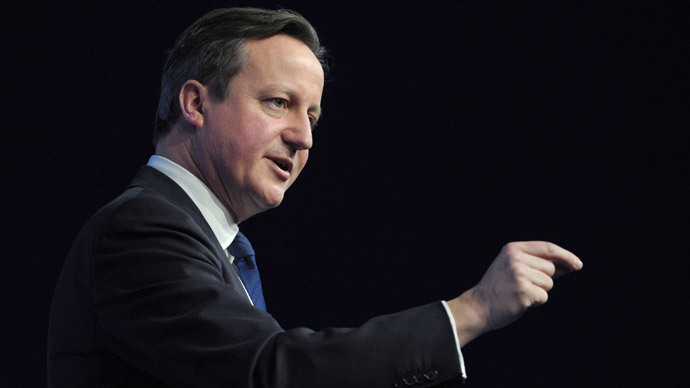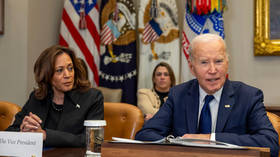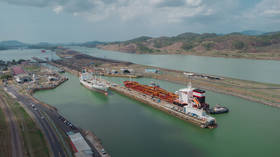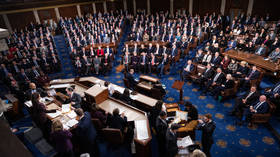British neo-McCarthyism or why UK media coverage falls short

There are moments when one could be forgiven for thinking that the mainstream media is beginning to learn the craft of journalism. That would obviously make the production of our show, Going Underground more difficult.
What if the BBC, ITN and Sky in the UK began realizing the country is amidst some of the greatest welfare cuts in history? What would we put in the show? Luckily, for us, the mainstream channels’ about turn on Syria – they have just discovered that anti-Assad forces have been hi-jacked by Salafist Islamists – is not because these channels’ foreign correspondents suddenly understand the polarities of multidimensional geopolitics. It’s arguable that MSM journalists merely realize that their masters have changed their minds about intervention. That’s why you don’t hear too much about the millions of refugees created in part by European and American governments.
Such is the extent of British neo-McCarthyism that even in 2014 not one of the main channels thought to cover a historic victory in the House of Commons in the past few weeks. The victory was against successive British governments that have tried to cover up events surrounding the only national builders’ strike in Britain’s history. MPs voted by 120 to three to call on David Cameron to release government papers detailing the convictions of 24 men who were accused of violent picketing and intimidating workers in Shropshire in 1972. The most famous worker who was jailed was Ricky Tomlinson, who has since become a highly successful actor. He appeared on Going Underground with a cohort of the so-called "Shrewsbury24" who were convicted under the 1875 Conspiracy Act.
Most journalists didn't even begin to ask the question “Why is this important today?” That’s because they probably weren't aware of it. If they had asked, the answer would be, of course, that the British government, with UK law enforcement authorities, have deliberately attempted to sabotage the desires of the majority of British people for decades – using surveillance and all the rest of the panoply of the UK secret state. Ricky Tomlinson told us that the state was trying its best to stop campaigners from changing a work regime for builders that had one person dying every day.

Just a few years after the strike, Sir David Omand began his career at the government’s top secret spying operation, GCHQ. He came on Going Underground to answer questions in the wake of the continuing Snowden revelations. Somewhat, surprisingly Sir David was pleased by one element of the disclosures. He said Snowden’s documents show off how successful the measures he took were when he eventually became head of GCHQ to closely cooperate with his US counterparts. As to the controversial relationship between GCHQ and the NSA – some have described the situation as the UK pimping out GCHQ to American secret services for cash – well, that’s good too. If a deal hadn't been done, then the UK taxpayer would have had to shell out money for spying, so tying Britain with the US made good business sense. He said he was proud that “we could see publically” how good GCHQ was. And it was a kind of business – I was struck by how Sir David, who eventually left GCHQ to become permanent secretary at the Home Office, used the word “customer” when it came to intelligence.
As for illegality when it came to surveillance, he was satisfied that at no point had his activities transgressed against UK legal constraints. He said that the moment The Guardian newspaper began publishing Snowden leaks, investigations into law began and everything was all clear. As for using the secret state for political means, it couldn’t happen. Never did a minister or the Prime Minister ring him up and ask for “x” to be put under surveillance. “The system has checks and balances in it,” he said.
It was Sir David who among others said the late government scientist David Kelly should be pursued for talking to a BBC radio show I was working on. It was just ahead of the Iraq war and when I asked him about the intelligence cooperation framework at that time, he insisted that not all the intelligence was wrong; Kelly had told us before he died that intelligence was being cooked by politicians. On Going Underground, Sir David said that GCHQ sat in on all the decision-making and he stands by the fact that on Saddam’s nuclear weapons assessments, the intelligence was right, citing the Butler Inquiry as support. Kelly’s expertise had been on biological weapons.
Given that only 1 percent or so of the Snowden revelations have actually been released to the wider public, we’ll be hoping Sir David comes on again to give us his insights. Ironically, the biggest national security threat to Britain has not turned out to be bomb-toting militants. The greatest threat to national security – whether it be the threats to our armed services, healthcare, mortality rates and every other aspect of civil society – is the perceived need to bail out Britain’s banks after the financial services industry collapsed. Check out our interview with the British Bankers Association to see if you think British-government subsidized banks have now reformed themselves. Or will banks again catalyze ever more austerity in Britain? It’s an austerity they caused and an austerity supported by all main parties in the House of Commons.
The statements, views and opinions expressed in this column are solely those of the author and do not necessarily represent those of RT.
The statements, views and opinions expressed in this column are solely those of the author and do not necessarily represent those of RT.













